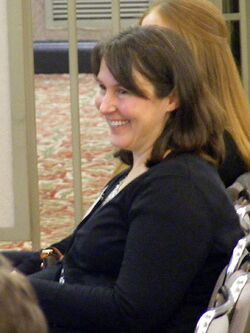
| Version | Summary | Created by | Modification | Content Size | Created at | Operation |
|---|---|---|---|---|---|---|
| 1 | Amina Yu | -- | 704 | 2022-11-14 01:19:25 |
Video Upload Options
1. Introduction
Frances A. Champagne is a psychologist and professor known for her research in the fields of molecular neuroscience, maternal behavior, and epigenetics. Her main research interest concerns how genetic and environmental factors interact to regulate maternal behavior, and how natural variations in this behavior can shape the behavioral development of offspring through epigenetic changes in gene expression in a brain region specific manner.[1] She won the NIH Director's New Innovator Award in 2007 and the Frank A. Beach Young Investigator Award in Behavioral Neuroendocrinology in 2009. Most importantly, she has been described the "bee's knees of neuroscience".[2]
2. Biography
Champagne received her B.A. degree in psychology at Queen's University, Canada. She attended graduate school at McGill University, Canada where she obtained both her M.Sc degree in psychiatry. She then earned her PhD degree in neuroscience where she studied under the mentorship of Michael Meaney.[3] Champagne did her postdoctoral research at the University of Cambridge, England where she studied animal behavior. She was an assistant professor of psychology at Columbia University, New York City until becoming associate professor.[4] Champagne previously served as an associate professor of psychology and vice chairperson at Columbia University. In 2017 she began her current tenure at University of Texas at Austin as a full professor in the department of psychology. She maintains her affiliation with Columbia University as an adjunct associate professor within the department of psychology.[5] As a full professor, she teachers courses including but not limited to the developing brain, behavioral epigenetics and ethics, genetics & the brain.[6]
3. Research
Champagne's research has examined the neurobiology of the parental brain including neural mechanisms underlying individual differences in maternal behavior and the effects of the environment on these neural circuits. Another main research interest is the epigenetic effects of maternal behavior and how epigenetic variation emerge in response to variation in mother-infant interactions experienced during development. She also researches prenatal programming of offspring development and the impact of prenatal exposure to stress, toxins, or nutritional variation on placental and offspring brain gene expression. Paternal-maternal interplay and offspring development is another research main interest of Champagne and is the impact of fathers on mothers and offspring and the epigenetic mechanisms through which this interplay occurs. In addition, she is interested in exploring ways to ameliorate the negative effects of adverse prenatal and postnatal experiences on development by investigating the epigenetic mechanisms that allow offspring to overcome or be resilient to such early life experiences.
Champagne has investigated the epigenetic mechanisms via which individual variation in reproductive and social behavior can be induced via variation in early (prenatal and postnatal) life experiences. She has explored the interplay between mothers and fathers in the development of offspring and transgenerational effects of early life experiences.[1]
In her new Epigenetics, Development & Neuroscience Lab, her and her lab members explore the changes that can occur throughout development as a result of environmental conditions. Most notably, the effect of prenatal exposure to bisphenols on mother and infant epigenetic and behavioral outcomes. This work is funded through the National Institute on Environmental Health Sciences. Bisphenols, including but not limited to Bisphenol A, otherwise known as BPA have previously been shown to be endocrine disrupting.[7]
Additionally, she is a co-investigator continuing the Boricua Youth Study that began at Columbia University, a longitudinal study aimed at understanding the risks and protective factors that Puerto Rican youth experience.[8] This project is funded through the National Institute on Child Health Development.
Lastly and most recently, she served on the committee for the Parental Brain Conference in 2018, a meeting focused on the biological and behavioral perspectives in parental health during the summer of 2018.[9]
References
- "Frances Champagne: Department of Psychology". https://psychology.columbia.edu/content/frances-champagne.
- "Frances Champagne Studies How a Mother's Care Affects the Brain". June 2017. https://news.columbia.edu/content/Frances-Champagne-Studies-How-a-Mothers-Care-Affects-the-Brain.
- "Neurotree". https://neurotree.org/beta/tree.php?pid=3640.
- "Champagne Lab". http://champagnelab.psych.columbia.edu/champagne.html.
- "Frances Champagne CV". https://liberalarts.utexas.edu/ffiles/fac752/n6mrmaiXrg.
- "Courses Frances Champagne Teaches". https://labs.la.utexas.edu/champagne/courses/.
- L. KOLATOROVA et al. (September 2017). "Prenatal exposure to bisphenols and parabens and impacts on human physiology.". Physiological Research 66. http://www.biomed.cas.cz/physiolres/pdf/66/66_S305.pdf.
- "The Boricua Youth Study | Columbia University | Child Psychiatry" (in en). https://childadolescentpsych.cumc.columbia.edu/professionals/research-programs/child-mental-health-disparities-development-group/boricua-youth.
- "Parental Brain Conference 2018 – Biological and Behavioural Perspectives in Parental Health" (in en-US). http://parentalbrain2018.com/.

Location: Unknown




